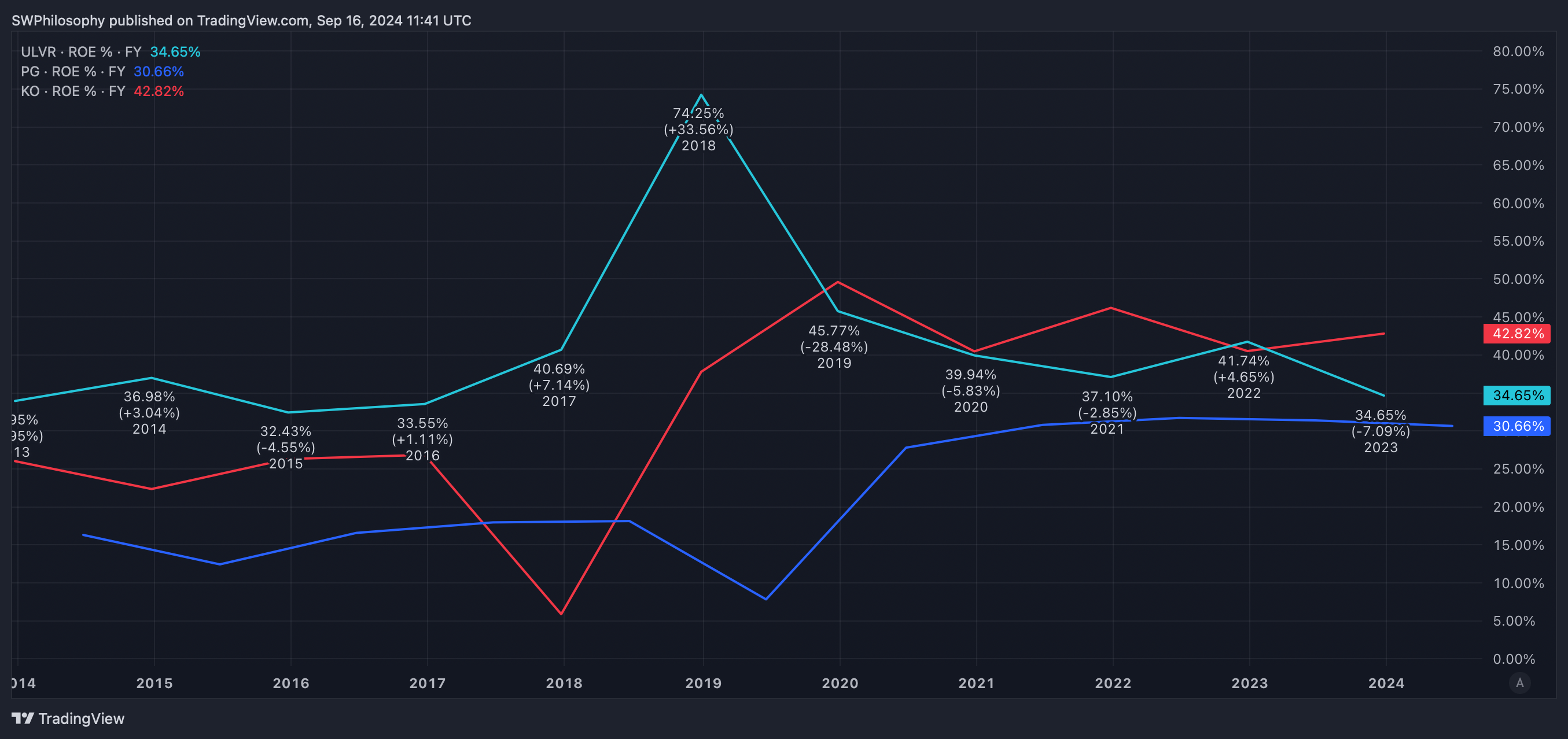Dividend shares can be a great source of passive income. And I think UK investors would do well to look close to home for opportunities.
There are three main reasons, some of which are more obvious than others. One is lower prices, another is tax efficiency, and a third is managing the risk of fluctuations in foreign exchange rates.
Lower prices
In general, UK stocks tend to trade at lower levels than their US counterparts. As an example, compare FTSE 100 giant Unilever (LSE:ULVR) with the likes of Procter & Gamble or Coca-Cola.
Both P&G and Coca-Cola are terrific businesses, but Unilever is right up there with them. Over the last 10 years, the UK firm has achieved similar – if not better – returns on equity.
Unilever vs. P&G vs. Coca-Cola returns on equity 2014-24
Created at TradingView
Despite this, Unilever shares trade at a price-to-earnings (P/E) multiple of 22, which is lower than P&G (29) or Coca-Cola (29). And its 3% dividend yield is higher as a result.
From a passive income perspective, I think this gives investors a reason to favour the UK stock. It offers a higher dividend yield for no obvious drop off in the quality of the underlying business.
Taxes
Unilever’s dividend yield is around 3%, compared to 2.3% for P&G and 2.7% for Coca-Cola. That might not look like much, but the gap widens when taking account of tax implications.
For UK investors, dividends from US stocks are subject to a 30% withholding tax (reduced to 15% with a W-8BEN form). This means shareholders in the UK shouldn’t expect the advertised yield.
After tax, that amounts to a 2% return from P&G and a 2.3% return from Coca-Cola. Unilever being listed in the UK, however, means there’s no such tax – investors should get the full 3%.
If someone holds all three in an ISA (and is thus exempt from dividend tax) the difference can be significant over time. And I think that’s something passive income investors should take note of.
Please note that tax treatment depends on the individual circumstances of each client and may be subject to change in future. The content in this article is provided for information purposes only. It is not intended to be, neither does it constitute, any form of tax advice. Readers are responsible for carrying out their own due diligence and for obtaining professional advice before making any investment decisions.
Foreign exchange
There’s one final consideration to keep in mind, as well. Distributions in US dollars have to be converted back to British pounds for UK investors and the exchange rate can vary.
Over the last 12 months, the pound is up around 6% against the dollar. That means a US stock would need to have increased its dividend by that much for UK investors to receive the same amount.
Of course, things can go the other way – a weakening pound can cause UK investors to receive more. But it’s an added source of uncertainty from otherwise relatively predictable businesses.
Unilever isn’t entirely insulated from this risk, with most of its revenue generated outside the UK. But with its dividend declared in pounds, income investors should at least be clear about what they’ll get.
UK shares
There’s always risk when it comes to investing. Even with Unilever, there’s a constant danger the company might struggle to keep its brand portfolio in line with consumer preferences.
Nonetheless, earning passive income is about finding stocks that can consistently generate the most cash. And from that perspective, I think there are good reasons for UK investors to look close to home.
This post was originally published on Motley Fool







